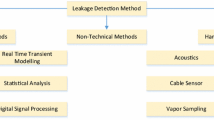Abstract
This paper presents a novel optimization algorithm for monitoring a complex water pipeline using Wireless Sensor Networks (WSN), in order to solve the trade-off between a timely and accurate detection of a leak, and an efficient utilization of the energy at the WSN’s nodes aimed at prolonging the WSN’s lifetime. The scheme relies on using vibration sensors of different sensitivities to detect vibrations due to a leak, and on exploiting duty-cycling, hierarchical adaptive sampling and wavelet-based signal compression, in order to reduce sensing, computation and communication energies. Given the constraints of a maximum allowable sensor energy, a limited time to detect a leak after it occurs, and an acceptable percentage of signal distortion due to compression, a new optimization-based backtracking learning algorithm is developed here that solves for the values of various monitoring parameters such that it satisfies all the given constraints. Developing such an optimization algorithm has also required performing a sensitivity analysis, i.e. investigating the effect of changing the key monitoring parameters on the performance of leak detection and energy consumption. Simulation results for various cases successfully demonstrate the effectiveness of the algorithm while supporting the prediction of the sensitivity analysis.




Similar content being viewed by others

References
Abbas M, AbuBaker K, Ayaz M, Mohamed H, Tariq M, Ahmed A, Faheem M (2018) Key Factors Involved in Pipeline Monitoring Techniques Using Robots and WSNs: Comprehensive Survey. Journal of Pipeline Systems Engineering and Practice 9(2):04018001
Anastasi G, Conti M, Di Francesco MD, Passarella A (2009) Energy conservation in wireless sensor networks: A survey. Ad Hoc Netw 7(3):537–568
Bhuiyan M, Wang G, Cao J, Wu J (2013) Energy and bandwidth-efficient Wireless Sensor Networks for monitoring high-frequency events. IEEE International Conference on Sensing, Communications and Networking, SECON 2013, pp. 194–202
El-Darymli K, Khan F, Ahmed MH (2009) Reliability modeling of wireless sensor network for oil and gas pipelines monitoring. Sensors & Transducers 106(7):6–26
Eliades G, Kyriakou M, Vrachimis S, Polycarpou M (2017) EPANET-MATLAB Toolkit: An Open-Source Software for Interfacing EPANET with MATLAB. Proc. 14th International Conference on Computing and Control for the Water Industry (CCWI), The Netherlands, p. 8
Evans R, Blotter J, Stephens A (2004) Flow Rate Measurements Using Flow-Induced Pipe Vibration. J Fluids Eng 126(2):280
Jawhar I, Mohamed N, Shuaib K (2007) A framework for pipeline infrastructure monitoring using wireless sensor network. Wireless Telecommunications Symposium (WTS), pp. 1–7
Kurp T, Gao R, Sah S (2010) An adaptive sampling scheme for improved energy utilization in wireless sensor networks. IEEE Instrumentation and Measurement Technology Conference (I2MTC), pp. 93–98
Latré B, Mil P, Moerman I, Dhoedt B, Demeester P, Dierdonck NV (2006) Throughput and Delay Analysis of Unslotted IEEE 802.15.4. Journal of Networks 1(1):20–28
Marmarokopos K, Doukakis D, Frantziskonis G, Avlonitis M (2018) Leak Detection in Plastic Water Supply Pipes with a High Signal-to-Noise Ratio Accelerometer. Measurement and Control 51(1–2):27–37
Martini A, Troncossi M, Rivola A (2013) Vibration Monitoring as a Tool for Leak Detection in Water Distribution Networks. Proc Surveillance 7:1–9
Molina-Espinosa L, Verde-Rodarte C, Cazarez-Candia O (2012) Mathematical model for pipeline leak simulation. Experimental and Theoretical Advances in Fluid Dynamics, Springer, pp. 303–311
Qu Z, Feng H, Zeng Z, Zhuge J, Jin S (2010) A SVM-based pipeline leakage detection and pre-warning system. Measurement 43(4):513–519
Raghunathan V, Schurgers C, Park S, Srivastava M (2002) Energy-aware wireless microsensor networks. IEEE Signal Process Mag 19(2):40–50
Saqib N, Mysorewala M, Cheded L (2017a) A Multiscale Approach to Leak Detection and Localization in Water Pipeline Network. Water Resour Manag 31(12):3829–3842
Saqib N, Mysorewala M, Cheded L (2017b) A novel multi-scale adaptive sampling-based approach for energy saving in leak detection for WSN-based water pipelines. Meas Sci Technol 28(12):125102
Sayood K (2012) Introduction to data compression. Newnes
Shinozuka M, Chou PH, Kim S, Kim HR, Yoon E, Mustafa H, Karmakar D (2010) Nondestructive Monitoring of a Pipe Network using a MEMS-Based Wireless Network. Proc. SPIE 7649, Nondestructive Characterization for Composite Materials, 76490P
Stoianov I, Nachman L, Madden S, Tokmouline T, Csail M (2007) PIPENET: A Wireless Sensor Network for Pipeline Monitoring. 6th International Symposium on Information Processing in Sensor Networks, pp. 264–273
Yazdekhasti S, Piratla K, Atamturktur S, Khan A (2017) Experimental evaluation of a vibration-based leak detection technique for water pipelines. Struct Infrastruct Eng 14(1):46–55
Zhou H, Luo D, Gao Y, Zuo D (2011) Modeling of Node Energy Consumption for Wireless Sensor Networks. Wirel Sens Netw 03(01):18–23
Acknowledgements
The author acknowledges the support provided by the Deanship of Scientific Research (DSR) at King Fahd University of Petroleum & Minerals (KFUPM) for funding this work through Project no. FT161017, and the numerous constructive discussions on this topic held with his team member Prof. L. Cheded.
Author information
Authors and Affiliations
Corresponding author
Ethics declarations
Conflict of Interest
There is no conflict of interest.
Additional information
Publisher’s Note
Springer Nature remains neutral with regard to jurisdictional claims in published maps and institutional affiliations.
Rights and permissions
About this article
Cite this article
Mysorewala, M. Time and Energy Savings in Leak Detection in WSN-Based Water Pipelines: A Novel Parametric Optimization-Based Approach. Water Resour Manage 33, 2057–2071 (2019). https://doi.org/10.1007/s11269-019-02232-9
Received:
Accepted:
Published:
Issue Date:
DOI: https://doi.org/10.1007/s11269-019-02232-9



